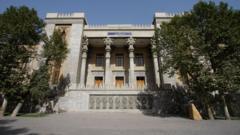The case highlights tensions surrounding Thailand's stringent laws against criticism of the monarchy.
**Arrest Warrant Issued for American Scholar in Thailand’s Lese-Majeste Controversy**

**Arrest Warrant Issued for American Scholar in Thailand’s Lese-Majeste Controversy**
A Thai court's warrant raises questions about academic freedom and political repression.
In a significant legal development, a Thai court has issued an arrest warrant for Paul Chambers, an American academic and lecturer at Naresuan University, under Thailand’s lese-majeste law, which prohibits insults to the monarchy. The complaint was lodged by the Thai army, accusing Chambers of violating both lese-majeste and computer crime laws. Chambers, along with his legal team, is expected to report to authorities on Tuesday to face potential charges.
Advocacy lead Akarachai Chaimaneekarakate from the Thai Lawyers for Human Rights Centre, representing Chambers, expressed uncertainty about the specific allegations, which suggest "defamation, contempt or malice" towards the royal family and unauthorized dissemination of information that could threaten national security. If convicted of the lese-majeste counts, Chambers risks a prison sentence ranging from three to 15 years for each charge.
Historically, prosecutions under the lese-majeste law have been rare for foreigners, although incidents have occurred. The army’s filing of the complaint follows a broader trend of increased enforcement of these laws post-2020, particularly following student-led protests advocating for political reform and reduced royal influence. Over 300 lese-majeste cases have been noted in recent years, involving numerous individuals including minors.
Chambers, who has lived and worked in Thailand for three decades and authored several books on the Thai military, has never faced such allegations before. The law enacted in 1908 has faced criticism for being a barrier to free speech, especially as recent protests have reignited calls to reform or repeal it.
In parallel, the European Parliament urged Thailand to amend its lese-majeste laws, citing their stringent nature, and called for the release of those affected by such prosecutions. Discussions regarding possible amnesty bills are set to take place in the Thai Parliament soon, an event that may shape the future legal landscape surrounding this contentious issue of free expression in Thailand.
Advocacy lead Akarachai Chaimaneekarakate from the Thai Lawyers for Human Rights Centre, representing Chambers, expressed uncertainty about the specific allegations, which suggest "defamation, contempt or malice" towards the royal family and unauthorized dissemination of information that could threaten national security. If convicted of the lese-majeste counts, Chambers risks a prison sentence ranging from three to 15 years for each charge.
Historically, prosecutions under the lese-majeste law have been rare for foreigners, although incidents have occurred. The army’s filing of the complaint follows a broader trend of increased enforcement of these laws post-2020, particularly following student-led protests advocating for political reform and reduced royal influence. Over 300 lese-majeste cases have been noted in recent years, involving numerous individuals including minors.
Chambers, who has lived and worked in Thailand for three decades and authored several books on the Thai military, has never faced such allegations before. The law enacted in 1908 has faced criticism for being a barrier to free speech, especially as recent protests have reignited calls to reform or repeal it.
In parallel, the European Parliament urged Thailand to amend its lese-majeste laws, citing their stringent nature, and called for the release of those affected by such prosecutions. Discussions regarding possible amnesty bills are set to take place in the Thai Parliament soon, an event that may shape the future legal landscape surrounding this contentious issue of free expression in Thailand.




















